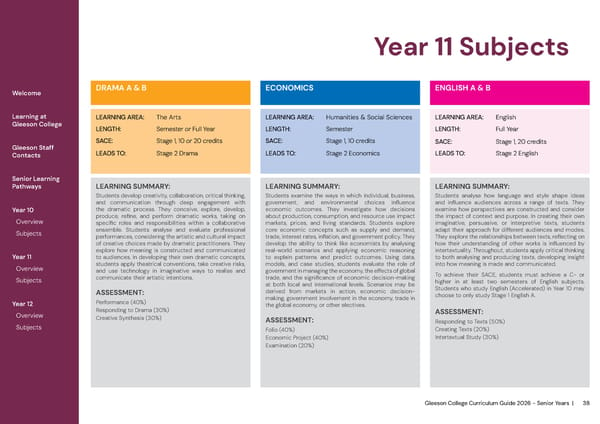Gleeson College Curriculum Guide 2026 - Senior Years | 38 Year 11 Subjects Welcome Learning at Gleeson College Gleeson Staff Contacts Senior Learning Pathways Year 10 Overview Subjects Year 11 Overview Subjects Year 12 Overview Subjects LEARNING SUMMARY: Students develop creativity, collaboration, critical thinking, and communication through deep engagement with the dramatic process. They conceive, explore, develop, produce, refine, and perform dramatic works, taking on specific roles and responsibilities within a collaborative ensemble. Students analyse and evaluate professional performances, considering the artistic and cultural impact of creative choices made by dramatic practitioners. They explore how meaning is constructed and communicated to audiences. In developing their own dramatic concepts, students apply theatrical conventions, take creative risks, and use technology in imaginative ways to realise and communicate their artistic intentions. ASSESSMENT: Performance (40%) Responding to Drama (30%) Creative Synthesis (30%) DRAMA A & B LEARNING AREA: The Arts LENGTH: Semester or Full Year SACE: Stage 1, 10 or 20 credits LEADS TO: Stage 2 Drama ECONOMICS LEARNING AREA: Humanities & Social Sciences LENGTH: Semester SACE: Stage 1, 10 credits LEADS TO: Stage 2 Economics LEARNING SUMMARY: Students examine the ways in which individual, business, government, and environmental choices influence economic outcomes. They investigate how decisions about production, consumption, and resource use impact markets, prices, and living standards. Students explore core economic concepts such as supply and demand, trade, interest rates, inflation, and government policy. They develop the ability to think like economists by analysing real-world scenarios and applying economic reasoning to explain patterns and predict outcomes. Using data, models, and case studies, students evaluate the role of government in managing the economy, the effects of global trade, and the significance of economic decision-making at both local and international levels. Scenarios may be derived from markets in action, economic decision- making, government involvement in the economy, trade in the global economy, or other electives. ASSESSMENT: Folio (40%) Economic Project (40%) Examination (20%) ENGLISH A & B LEARNING AREA: English LENGTH: Full Year SACE: Stage 1, 20 credits LEADS TO: Stage 2 English LEARNING SUMMARY: Students analyse how language and style shape ideas and influence audiences across a range of texts. They examine how perspectives are constructed and consider the impact of context and purpose. In creating their own imaginative, persuasive, or interpretive texts, students adapt their approach for different audiences and modes. They explore the relationships between texts, reflecting on how their understanding of other works is influenced by intertextuality. Throughout, students apply critical thinking to both analysing and producing texts, developing insight into how meaning is made and communicated. To achieve their SACE, students must achieve a C- or higher in at least two semesters of English subjects. Students who study English (Accelerated) in Year 10 may choose to only study Stage 1 English A. ASSESSMENT: Responding to Texts (50%) Creating Texts (20%) Intertextual Study (30%)
 2026 Gleeson College Senior Years Curriculum Guide 2026 Page 37 Page 39
2026 Gleeson College Senior Years Curriculum Guide 2026 Page 37 Page 39